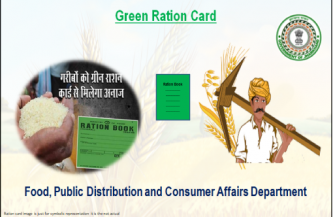Technology at your service

The digital revolution has transformed the lives of ordinary citizens, given power to the poorest and marginalized, and offered the young the ability to create
Until a few years ago, access to technology was considered a privilege restricted to the urban elite. The internet was unaffordable for people in rural areas. Only 25 crore Indians used the internet till 2014, which increased to 84 crore in 2022. Earlier, the cost of 1GB of data was about Rs 300. Now it has come down to about Rs 13.5 per GB, making it affordable. This is a snapshot of how Prime Minister Narendra Modi has driven inclusion through technology in New India.
The pandemic was a testing time and Digital India minimised the impact of disruption. The affordability of the uninterested inaccessibility of services. When education in schools went online during the pandemic, Suhani Sahu, a student in Balrampur, UP, attended her course curriculum online via the Diksha platform. Shubham Kumar living in a village in East Champaran, Bihar, ensured uninterrupted treatment of his ailing mother, saving on travel time and cost by taking teleconsultation from a doctor on the eSanjeevani app. Over 10 crore such teleconsultations have happened so far.
Hari Ram, a taxi driver in Dehradun, had a ration card from Hardoi in UP. The One Nation One Ration Card framework helped him access food supplies even in Dehradun. The Gramin Dak Sevaks of India Post provided financial service assistance at doorsteps using the Aadhaar Enabled Payment System (AePS) to people in the remotest corner of the country.
PM Modi’s thrust on turning technology into a tool against poverty and improving the ease of living has benefitted the Indian masses.
Digital technologies have come of age. They have become an integral part of our lives. AI, 5G, and quantum technology have matured to a level where they are becoming mainstream.
This makes 2023 an inflexion point. In these exciting times, India has assumed the leadership of the G20. Atmanirbhar Bharat is ready to showcase its technology platforms to the world with the philosophy of using them for the greater good.
PM Modi has said “Today, people do not see the government as an obstacle; rather, people see our government as a catalyst for new opportunities. Certainly, technology has played a big role in this.” These words echo across the nation and this vision-led transformation is visible in every nook and corner of India. India went on a complete digital transformation. The country is focused on creating public digital platforms which are open source, available to everybody, of large scale and born-digital.
That’s how CoWIN was developed. The entire process of onboarding vaccine manufacturers, clinics, hospitals, registration of citizens, and scheduling, till the final certificate of vaccination, is digital. This enabled India to administer 150 crore doses within the first 12 months of the vaccination drive. India has now delivered close to 220 crore doses. Today, CoWIN has become a ground-breaking example of democratising digital technology.
It is no coincidence that India has shown a unique way to use technology to benefit society. Today, street vendors, vegetable carts, small shops, and big showrooms across India have QR (quick response) code stickers for digital payments. Payment QR codes randomly placed for scanning while piping hot tea and snacks at a roadside small tea stall have become an everyday sight.
Using public funds, we created a platform where banks have joined, as have insurance companies, e-commerce companies, MSMEs, startups and most importantly 120 crore people have joined. In this public-private partnership, no single entity has complete control over the platform, making it democratic.
Launched in 2016, UPI now does $1.5 trillion worth of transactions every year. The average settlement time for each transaction is two seconds. This has led to an increase in transparency and convenience. This is why India’s UPI has become a global standard for digital payments.
Technology’s role in enhancing the ease of living is becoming increasingly visible by the day. The FAST tag technology has ensured that our vehicles continue blazing through the highways without stopping. This use of technology has reduced congestion and the waiting time at the toll plazas, providing smooth movement within our borders, while boosting digital payments.
Technology has taken a giant leap with the rollout of 5G. While launching 5G services in India, PM Modi shared his vision of using 5G in healthcare, education, agriculture, construction sectors etc., to make living easy for people. India is also relentlessly working towards becoming a 4G and 5G technology exporter in the coming three years.
We have proved the prowess of our engineers and scientists with these scalable digital public goods. Now we’re developing the OCEN (open credit enablement network), which will raise credit penetration by transitioning the system to cash flow-based lending. OCEN will lead to competition among various banks for giving loans to a person, lowering the cost of credit. According to Morgan Stanley estimates, this will propel the credit-to-GDP ratio from the current 57 per cent to 100 per cent by 2031.
This game-changing digital and tech-led revolution powered by PM Modi’s vision empowers and transforms the lives of ordinary citizens. It gives power to the poorest and marginalized sections and offers the ability to create something in the hands of the creative minds of the young and talented generation. This model is now being replicated across different sectors. Be it the health sector, education, logistics, agriculture or defence, similar platforms are being created on which a vibrant ecosystem of startups or any enterprise can build solutions.
India has entered its Amrit-Kaal in times of global uncertainty. Moving forward, under the farsighted, decisive and action-oriented leadership of PM Modi, India’s G20 Presidency will be pathbreaking, serving and sharing our scalable public digital infrastructure with the world.
Writer: Shri Ashwini Vaishnav, Minister for Railways, Communications, Electronics & Information Technology





